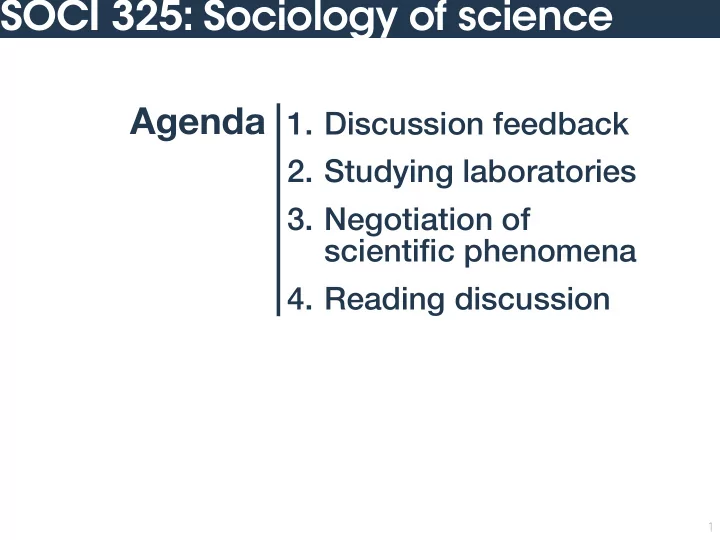

SOCI 325: Sociology of science Agenda 1. Discussion feedback 2. Studying laboratories 3. Negotiation of scientific phenomena 4. Reading discussion 1
Discussion feedback 2
Discussion feedback Realism vs. skepticism ⦙ Scientific realists do not necessarily believe that all accepted theoretical entities are real. ⦙ Could, e.g., believe that atoms are real, but that gravitational waves are nothing but a useful theoretical fiction. Anti-realism vs. phenomena ⦙ Anti-realists do not deny that the phenomena surrounding theoretical entities exist. ⦙ E.g. objects falling does not prove the independent reality of gravity. Causation and observation ⦙ Even in a purely causalist perspective of realism, entities and their consequences are distinct. ⦙ Observing the e ff ects of a theoretical entity is not the same as observing the entity itself. 3
Studying laboratories 4
Studying laboratories Scientific labs as site In the 1970s and 1980s, STS scholars began conducting ethnographies in scientific labs. If scientific knowledge has a social component, scholars should focus on the process of knowledge creation. Study the formulation of facts in a lab just as you would study any social process—field work, ethnography, conversation analysis, interviews, … 5
Studying laboratories Themes of laboratory studies Tacit knowledge ⦙ A big part of scientific cannot be written down, but is embodied in skills, ‘tinkering’ (Knorr Cetina) , and tacit knowledge (Collins) ⦙ “… experiments do not work; the numbers have to be cooked, the reaction doesn't react, the phage does not grow.” (Hacking 1983, 229) Negotiation ⦙ Scientific observations, findings, and facts are not apparent, but must be actively constructed. Translation ⦙ Particular findings are susceptible to varied narratives. ⦙ Scientists must engage in translation of facts and data for di ff erent purposes (Latour, Callon) . 6
Negotiation of scientific phenomena 7
Negotiating phenomena Transferring knowledge (Collins 1975) Replication in science involves transmitting knowledge about a phenomena of interest. How should we understand this process? ⦙ Algorithmical model : “a finite series of unambiguous instructions which can be formulated [and] transferred” (206) ⦙ Enculturational model : Reproduction relies on shared assumptions, skills, and baseline knowledge. The only way to tell whether knowledge has been transferred is to see if the recipient’s experiment ‘ works .’ 8
Negotiating phenomena Gravitational waves In the 1970s, scientists had not yet settled on what a credible experiment to detect gravitational waves should look like. There was no agreement on what would qualify as “ working .” Detecting gravitational waves was part of the normal science of confirming Einstein’s general relativity. In negotiating what constituted a “competent” experiment in gravitational waves, the scientists were actually negotiating the relevant characteristics of gravitational waves. Joseph Weber working on a resonant- mass gravitational wave antenna, or “Weber bar” (c. 1965) If gravitational waves were purely theoretical (in 1975), then to negotiate their characteristics was to negotiate gravitational waves themselves . 9
Negotiating phenomena It may not be long before the scientific community decides that the claims of the originator are completely spurious, or on the other hand, revolutionary. When that happens, and a new natural element in the scientific world has been constructed, the following section of my paper will look quaint. That is what is particularly interesting about writing it now before the solid existence of the facts clouds the look of contingency about their origins. (Collins 1975, 209) ⦙ International network of large interferometers ⦙ Agreement on “What counts as a ‘working gravity wave detector’” (Collins 1975, 211) ⦙ Agreement on relevant properties of gravitational waves One of the Virgo interferometers (near Pisa, Italy) used in the first ‘direct’ observation of gravitational waves in 2017 10
Discussion 11
Discussion Small-group discussions: ⦙ Choose a new facilitator who will keep the discussion focussed and make sure everyone is able to participate. ⦙ Choose a new secretary who will take notes and summarize the group’s responses for submission. ⦙ Download today’s discussion questions (Microsoft Word format) from the link on the syllabus. Make a copy and upload to MyCourses. https://soci325.netlify.com/discussion_questions/07.01.docx Notes: ⦙ Try to respond to (almost) all of the questions. ⦙ Avoid terse, bullet-point style. ⦙ Refer directly to the text. ⦙ Focus on quality over quantity . 12
Next class Representing reality Required reading: • Amann and Cetina (1988) The Fixation of (Visual) Evidence 13
Recommend
More recommend